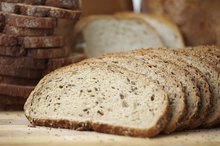What does fact checked mean?
At Healthfully, we strive to deliver objective content that is accurate and up-to-date. Our team periodically reviews articles in order to ensure content quality. The sources cited below consist of evidence from peer-reviewed journals, prominent medical organizations, academic associations, and government data.
- Cleveland Clinic: Eating Well After A Stroke
- Harvard School of Public Health: Health Gains from Whole Grains
- American Heart Association: Fish and Omega-3 Fatty Acids
The information contained on this site is for informational purposes only, and should not be used as a substitute for the advice of a professional health care provider. Please check with the appropriate physician regarding health questions and concerns. Although we strive to deliver accurate and up-to-date information, no guarantee to that effect is made.
Foods for Stroke Patients
A stroke occurs when the blood supply to a part of your brain is blocked or reduced, depriving brain tissue of oxygen and needed nutrients. Stokes can be life-threatening and require immediate medical attention. They are, however, treatable. According to the Cleveland Clinic, a healthy diet after a stroke is important for recovery as well as for preventing potential future strokes 1.
Fruits and Vegetables
Fruits and vegetables provide an array of beneficial nutrients, such as:
- vitamins
- minerals
- dietary fiber
- antioxidants
- which support a healthy immune system
The Cleveland Clinic suggests five or more servings of fruits and vegetables daily to reduce likelihood of future strokes. One serving of fruit is equal to one medium-size fruit, one 4-inch piece of banana, 1/2 cup canned fruit in natural juices, 1 cup cubed melon or berries or 4 ounces of fruit juice. One vegetable serving is equal to 1 cup fresh vegetables, 1/2 cup cooked vegetables or 6 ounces vegetable juice. Incorporate a variety of fresh, colorful fruits and vegetables to reap the broadest mix of nutrients.
- Fruits and vegetables provide an array of beneficial nutrients, such as: * vitamins
* minerals
* dietary fiber
* antioxidants
* which support a healthy immune system The Cleveland Clinic suggests five or more servings of fruits and vegetables daily to reduce likelihood of future strokes. - One serving of fruit is equal to one medium-size fruit, one 4-inch piece of banana, 1/2 cup canned fruit in natural juices, 1 cup cubed melon or berries or 4 ounces of fruit juice.
Whole Grains
Diabetics and Butter
Learn More
According to the Harvard School of Public Health, a diet rich in whole-grain foods reduces your risk for cardiovascular disease and stroke. Incorporate a variety of whole grains such as:
- oats
- bulgur
- barley
- whole wheat
- brown rice
- wild rice
- popcorn
- spelt into your diet regularly to limit your risk for future strokes
Lean Protein
Protein is vital for muscle growth and tissue repair. When cooking or ordering protein-based foods, choose grilled, steamed or baked options, because frying adds unhealthy fat to the meal. When grilling, use modest amounts of olive oil, which is considered a healthy fat, rather than butter. Fatty fish, such as salmon, tuna or mackerel, are also good protein sources that provide omega-3 fats, essential fats the body can't make on its own. The American Heart Association recommends at least two 3-ounce servings of fish per week for optimum health 2.
- Protein is vital for muscle growth and tissue repair.
- Fatty fish, such as salmon, tuna or mackerel, are also good protein sources that provide omega-3 fats, essential fats the body can't make on its own.
Related Articles
References
Writer Bio
August McLaughlin is a certified nutritionist and health writer with more than nine years of professional experience. Her work has been featured in various magazines such as "Healthy Aging," "CitySmart," "IAmThatGirl" and "ULM." She holds specializations in eating disorders, healthy weight management and sports nutrition. She is currently completing her second cookbook and Weight Limit—a series of body image/nutrition-related PSAs.









